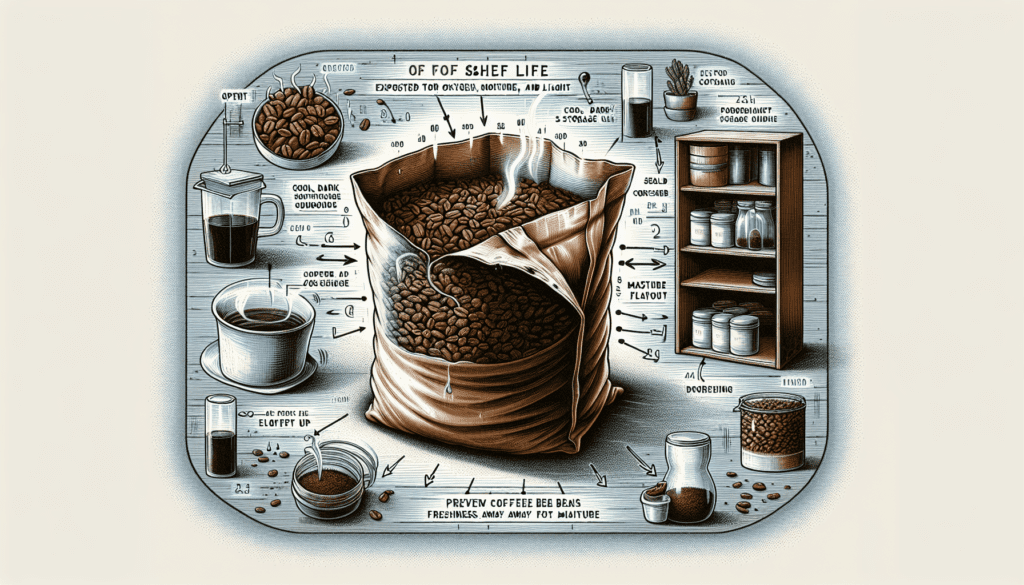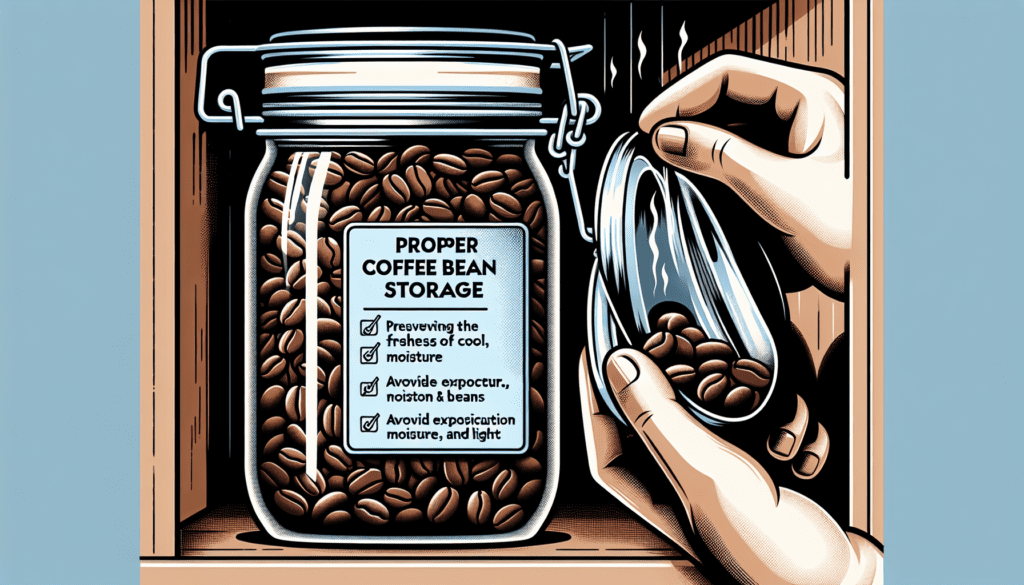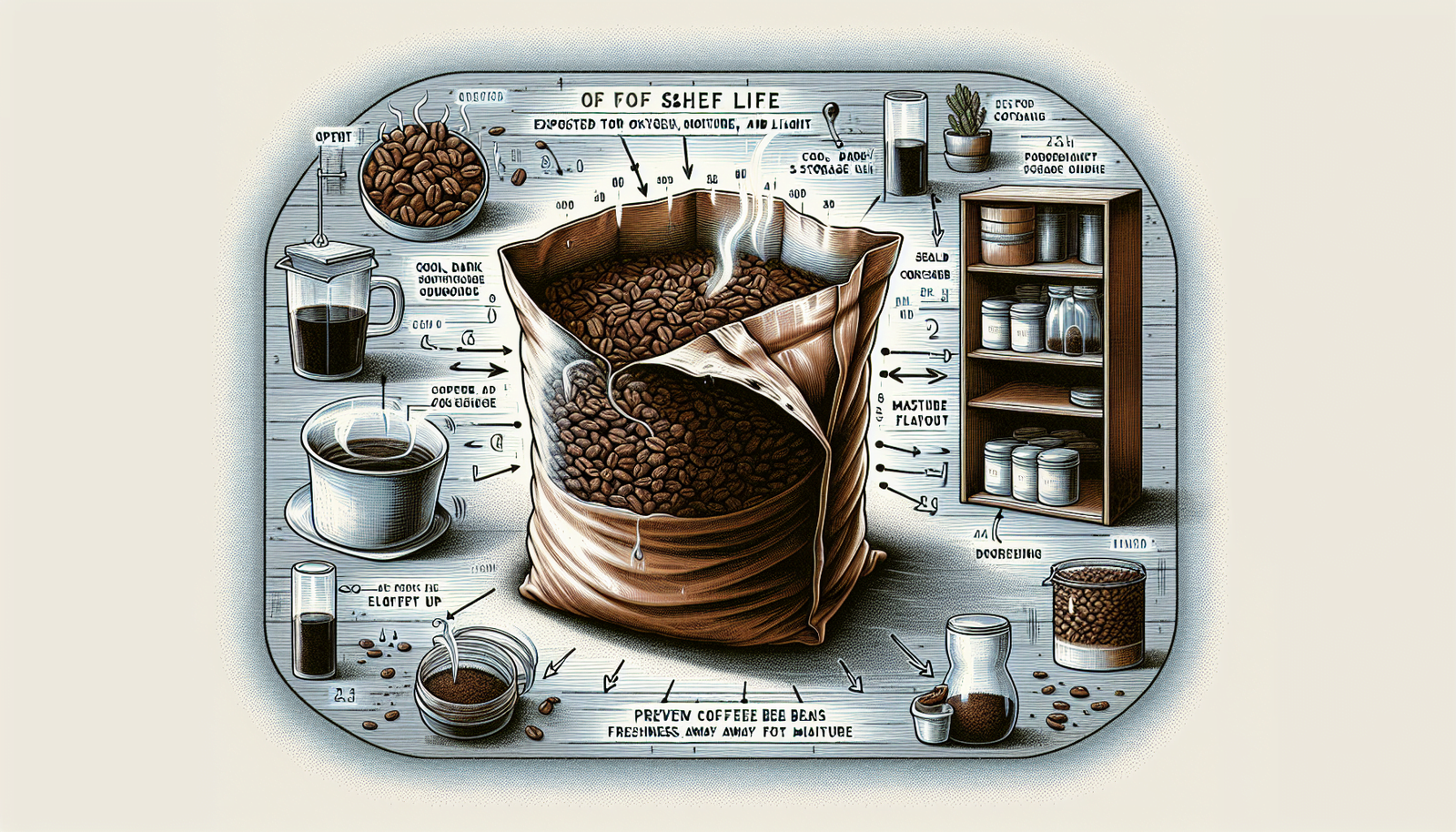Coffee beans, the heart and soul of the caffeinated world. From the best beans for espresso to the concept of chocolate-covered coffee beans, the journey of coffee is a delightful one. But have you ever wondered if coffee beans can go bad? Understanding the storage and shelf life of coffee beans is crucial for all coffee enthusiasts. In this article, we’ll explore the lifespan of coffee beans, from their origins and different varieties to the storage methods that keep them fresh. So, let’s dive into the world of coffee beans and find out if they can truly go bad.
Coffee Beans Shelf Life
Coffee beans are a beloved staple in the lives of many people, providing that much-needed caffeine boost to start the day or a comforting moment of relaxation. But have you ever wondered about the shelf life of coffee beans? How long can you keep them before they start to lose their flavor and freshness? In this article, we will explore the factors that affect the shelf life of coffee beans, signs of spoiled beans, proper storage methods, and tips for prolonging their freshness.
Factors That Affect Shelf Life
Several factors can influence the shelf life of coffee beans. The first factor is the harvesting and processing methods. Coffee beans that are grown and processed using high-quality methods tend to have a longer shelf life compared to those that are poorly harvested or processed.
Another crucial factor is the roasting process. Coffee beans that are roasted to perfection and ground just before brewing tend to retain their flavor and freshness for a longer time. Roasting helps to bring out the unique flavors and aromas of the coffee, but it also accelerates the oxidation process, which can lead to a shorter shelf life.
Signs of Spoiled Coffee Beans
It’s essential to be able to identify spoiled coffee beans before using them to ensure a pleasant and safe coffee-drinking experience. One of the most obvious signs of spoiled coffee beans is mold growth. If you notice any fuzziness or unusual discoloration on the beans, it’s best to discard them immediately.
Another indicator of spoiled coffee beans is a rancid smell. Fresh coffee beans have a delightful aroma, but if they smell off, sour, or rotten, it’s a clear sign that they have gone bad. Additionally, if the flavor of your brewed coffee is bitter, sour, or unpleasant, it may be due to using spoiled beans.
Understanding Coffee Beans Shelf Life
To understand the shelf life of coffee beans better, let’s delve into the processes that the beans go through before reaching your cup: harvesting, processing, roasting, and grinding.
Harvesting and Processing Methods
Coffee beans are typically harvested manually or mechanically. Manual harvesting involves carefully picking only the ripe coffee cherries, ensuring optimal quality. Mechanical harvesting, on the other hand, involves stripping the entire coffee tree of its cherries, which can result in a mix of ripe and unripe cherries. Coffee beans harvested using manual methods tend to have a longer shelf life due to their superior quality.
After harvesting, coffee beans go through a processing stage to remove the outer fruit and parchment layer. Two primary processing methods are commonly used: the dry method, which involves drying the whole cherries in the sun, and the wet method, which involves removing the pulp before drying the beans. The wet method typically yields beans with a longer shelf life due to the removal of the fruit’s sugars and moisture.
Roasting and Grinding
Roasting coffee beans is a critical step that gives them their distinctive flavors, aromas, and colors. During the roasting process, the beans undergo chemical changes that develop complex flavors and break down any remaining moisture content. However, roasting also accelerates the oxidation process, which can lead to a shorter shelf life if not properly stored.
grinding coffee beans exposes more surface area to air, causing them to lose flavor and freshness more quickly. To maximize the shelf life of your coffee beans, it’s best to grind them just before brewing. This helps to preserve the flavors and aromas locked within the beans, resulting in a more satisfying cup of coffee.

Storing Coffee Beans Properly
Proper storage is crucial to ensure that your coffee beans stay fresh and flavorful for as long as possible. The following factors play a significant role in preserving the quality of your beans: the container and environment, and avoiding moisture and oxygen exposure.
Container and Environment
To store coffee beans properly, it’s essential to use an airtight container that can protect them from exposure to air, moisture, and light. Glass jars with airtight lids or specially designed coffee storage containers are ideal for this purpose. It’s important to choose a container that is not porous, as exposure to moisture and air can lead to the beans losing their flavor and becoming stale.
In addition to the container, the environment in which you store your coffee beans also plays a role in their shelf life. It’s best to keep your beans in a cool, dry place away from direct sunlight, heat, and humidity. Avoid storing them near the stove or other appliances that generate heat, as this can accelerate the deterioration of the beans.
Avoiding Moisture and Oxygen Exposure
Moisture and oxygen are the enemies of coffee beans when it comes to shelf life. Exposure to moisture can lead to mold growth, while exposure to oxygen can cause the beans to become stale. To prevent moisture and oxygen exposure, make sure that the container you use is airtight and stored in a dry location.
It’s also important to avoid repeatedly opening and closing the container, as this can introduce moisture and oxygen. Instead, scoop out the amount of beans you need for each use without exposing the rest of the beans to the air. This can help extend the freshness of your coffee beans and ensure a more satisfying cup of coffee.
Expiration Date
When it comes to coffee beans, you may be wondering if they have expiration dates like other perishable products. The answer is not a straightforward yes or no.
Do Coffee Beans Have Expiration Dates?
Coffee beans do not have expiration dates in the traditional sense. Unlike milk or meat, coffee beans do not spoil or become unsafe to consume after a certain date. However, their quality and freshness start to deteriorate over time, affecting the taste of the brewed coffee.
Coffee Beans Best Before vs. Use By Dates
Instead of expiration dates, coffee beans often come with best before or use by dates. These dates indicate the timeframe during which the coffee beans are expected to be at their peak quality and flavor. While it’s safe to consume coffee beans past these dates, they may not deliver the same level of freshness and taste.
It’s important to note that the best before and use by dates on coffee bean packages are just guidelines. The actual shelf life of the beans can vary depending on factors such as the quality of the beans, the roast level, and the storage conditions. It’s always best to rely on your sensory evaluation of the beans to determine whether they are still fresh enough for your liking.

How Long Do Coffee Beans Last?
The shelf life of coffee beans depends on several factors, including their form and how they are stored. Let’s explore the estimated shelf life of whole bean and ground coffee.
Whole Bean Coffee
Whole bean coffee, when stored properly, can retain its freshness for approximately six to nine months from the roast date. However, it’s important to note that the flavors and aromas will gradually diminish over time. As a general rule, the earlier you consume your whole bean coffee, the better it will taste.
Ground Coffee
Unlike whole bean coffee, ground coffee has a shorter shelf life. Once coffee is ground, it exposes more surface area to air and moisture, causing it to lose flavor and freshness more quickly. Ground coffee typically stays fresh for about two to four weeks from the roast date. After this period, the flavors start to deteriorate, resulting in a less satisfying cup of coffee.
To ensure the best taste and quality, it’s recommended to grind your coffee beans just before brewing. This way, you can maximize the freshness and enjoy a more flavorful cup of coffee.
Extending the Shelf Life of Coffee Beans
If you want to prolong the shelf life of your coffee beans, there are a couple of methods you can try: freezing coffee beans and using vacuum-sealed containers.
Freezing Coffee Beans
One way to extend the freshness of your coffee beans is by freezing them. Freezing helps to slow down the oxidation process and preserve the flavors and aromas of the beans. However, it’s crucial to follow the proper freezing and thawing procedures to avoid any negative effects on the flavor and quality of the beans.
To freeze coffee beans, divide them into smaller portions and place them in airtight bags or containers. Make sure to remove as much air as possible before sealing the bags or containers. When you want to use the frozen beans, thaw only the portion you need and avoid refreezing them.
Vacuum-Sealed Containers
Using vacuum-sealed containers is another effective method to extend the shelf life of coffee beans. These containers remove excess air from the container, creating a vacuum seal that helps to preserve the freshness of the beans.
Vacuum-sealed containers are available in various sizes and designs, allowing you to choose one that suits your needs. Remember to store the container in a cool, dry place away from heat and light to further protect the beans from deterioration.
How to Tell If Coffee Beans Are Bad
Even with proper storage and care, coffee beans may eventually go bad. It’s important to know how to identify spoiled beans to ensure that you’re not consuming coffee that could be harmful or unpleasant.
Visual Inspection
One of the easiest ways to tell if coffee beans are bad is through a visual inspection. Check for any signs of mold or discoloration on the beans. If you notice fuzziness, spots, or an unusual color that differs from the usual dark brown or black, it’s best to discard those beans.
Aroma and Taste
Another way to determine if coffee beans are bad is through their aroma and taste. Fresh coffee beans have a rich, pleasant aroma, while spoiled beans may have a rancid or off smell. Similarly, brewed coffee made from bad beans will have an unpleasant taste, usually bitter, sour, or flat.
Trust your senses when evaluating the aroma and taste of your coffee. If something seems off or unpleasant, it’s a clear sign that the beans are past their prime and should not be used.
Health Risks of Consuming Spoiled Coffee Beans
Consuming spoiled coffee beans can pose some health risks due to the growth of mold and the presence of bacteria. Let’s explore the potential risks associated with spoiled coffee beans.
Mold and Mycotoxins
When coffee beans are exposed to moisture or stored in a damp environment, mold growth can occur. Mold produces mycotoxins, which are toxic substances that can be harmful when consumed in large quantities. People with mold allergies or sensitivities may experience allergic reactions or other health issues if they consume coffee made from moldy beans.
It’s important to note that the risk of mycotoxin contamination in commercial coffee beans is relatively low. However, if you notice any visible mold on your coffee beans, it’s best to discard them to avoid any potential health risks.
Bacterial Contamination
In addition to mold, coffee beans can also be susceptible to bacterial contamination, especially if they are stored improperly or for an extended period. Bacteria can multiply and thrive in moist and warm environments, potentially leading to foodborne illnesses if consumed.
To minimize the risk of bacterial contamination, it’s crucial to store your coffee beans in a dry and cool environment, away from moisture and heat sources. Additionally, ensure that your brewing equipment, such as coffee grinders and coffee makers, are kept clean to prevent the growth of bacteria.
Tips for Prolonging Coffee Beans Freshness
To ensure that your coffee beans stay fresh for as long as possible, consider the following tips:
Buy Freshly Roasted Beans
One of the best ways to guarantee freshness is to buy freshly roasted beans. Look for coffee roasters or specialty coffee shops that roast beans in small batches and display the roast date on the packaging. Fresher beans will have more vibrant flavors and aromas, providing a more enjoyable coffee-drinking experience.
Grind the Beans as Needed
Grinding coffee beans just before brewing is one of the most effective ways to maximize freshness. Whole bean coffee retains its flavors and aromas much better than pre-ground coffee, which starts to lose its qualities more quickly. Invest in a good quality coffee grinder and grind the beans shortly before brewing to enjoy the full potential of your coffee.
Conclusion
Proper storage plays a crucial role in maintaining the freshness and flavor of your coffee beans. By understanding the factors that affect the shelf life of coffee beans and implementing the right storage methods, you can prolong their freshness and enjoy a more satisfying cup of coffee. Whether you choose whole bean or ground coffee, remember to store them in an airtight container, away from moisture, oxygen, heat, and light.
While coffee beans do not have traditional expiration dates, they do have best before or use by dates that indicate optimal quality. Use your senses to evaluate the visual appearance, aroma, and taste of your coffee beans to determine if they are still fresh enough to use. If you notice any signs of spoilage, such as mold or an off smell, it’s best to discard the beans to avoid any potential health risks.
By following these tips and maintaining proper storage practices, you can enjoy the freshest and most flavorful coffee from your beans, ensuring that every cup is a delightful experience.

